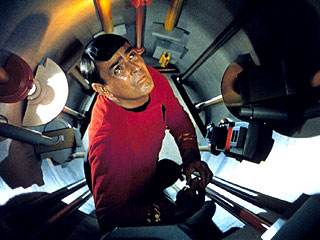Ask Yahoo looks into the origin of “peanut gallery” — a term that I’ve been enamored by over the years, perhaps because the idea of happy elephants enjoying a show (itself a fixation that goes back to my love of the film Fantasia) has always appealed to me. Not that I associate cheaper seats with elephants or anything, but this term that has always played tricks on my associative mind.
In any event, Ask Yahoo claims that the term predates Howdy Doody, dating back to 1888 in American theatres. The theory making the rounds is that people who sat in cheap seats often ate peanuts. But if I have a hunch this isn’t entirely correct. If these cheaper seats were the cost of “peanuts,” then it’s also possible that the “peanut gallery” may have come into popularity from this slang defintion. In the case of a theatre, a gallery is a roofed promenade or a long passage. So we’re talking about “peanuts” that were either fixed in place (as in seats for “peanuts”) or the sitting nature of theatregoers who were eating peanuts.
The question here is whether or not the affluent theatregoers actually went out of their way to crane their heads at people eating peanuts, or whether the “peanuts,” so to speak, drew attention to themselves:
The Word Detective weighs in with this:
The topmost tier (what we would call “the nosebleed seats” today) was the gallery, where the less affluent patrons ended up. Many of these folks were not shy about expressing their opinions when they found the performance lacking, and often employed the peanuts they bought to munch as handy missiles to get the actors’ attention. Thus, “peanut gallery” gradually took on its figurative meaning of “rowdy rabble.”
No doubt peanuts themselves were as noisy to eat back then as they are now, with considerable shell-cracking to boot. But there doesn’t seem to be anything I can find that corroborates what was served back then. If anyone is an expert on snacks that were served in theatres before the turn of the century, I’d definitely be curious to hear from them.
It is worth noting that peanuts were quite popular in the 1890s. George Washington Carver promoted the peanut as a replacement for the cotton crop, which had been decimated by the weevil. Only a decade or so later, all sorts of devices had been created to harvest peanuts in droves. So the transplant of the Brazilian nut must have taken a major hold upon both American life and, accordingly, American language.
